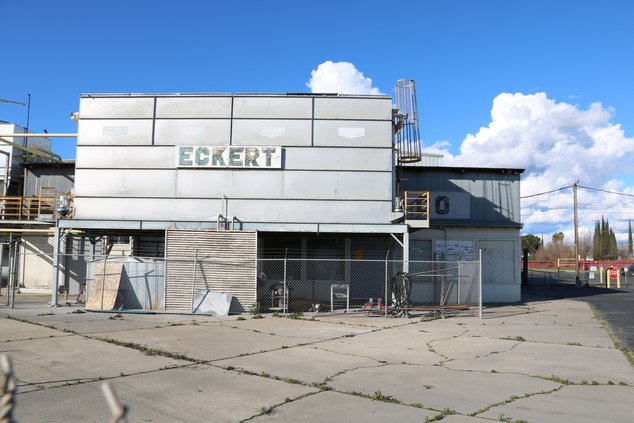A solution is in the works that could save hundreds of Manteca jobs.
Public Works Director Mark Houghton told the City Council on Tuesday municipal staff and Eckert’s Cold Storage representatives are working on an agreement that would allow the food processor on Moffat Boulevard to continue sending water used to wash bell peppers to the wastewater treatment plant.
“We are working on a solution so Eckert’s doesn’t have to close,” Houghton said.
The solution involves placing a package treatment plant specifically to treat the Eckert’s wastewater that arrives at the treatment plant site via a separate purple pipe. The water, after it is treated, would be placed in the pipe that sends treated wastewater from the city plant to the San Joaquin River for discharge.
Houghton said “rough” preliminary estimate of the cost would be between $1.5 million and $2 million. It has yet to be determined exactly who will pay for the package plant that is able to be relocated if needed in the future.
Staff expects an agreement to be before the council by May.
The agricultural wastewater became a problem after the city reduced the area at the wastewater facility for land disposal in order to allow Great Wolf to buy 30 acres connected with the plant site to build a $180 million 500-room hotel and indoor waterpark resort.
In the interim the city has worked experts hired by Eckert’s along with the Central Valley Regional Water Control Board to dispose of the agricultural water by blending it with less treated wastewater before applying it to less land. That option will eventually disappear as the city develops other land at the wastewater treatment plant north of the Great Wolf site and west of Big League Dreams as a family entertainment zone.
Houghton said some odor may be created in connection with the interim solution that is expected to be in place only one or two years.
Sending the water used to wash the bell peppers prior to being processed — especially the red ones — that are heavily laden with nitrates would consume capacity that the city would rather be used to accommodate growth in housing and other sectors. Expensive changes would also have to be made to the plant.
Nineteen years ago the city stopped treating Eckert’s discharges after it knocked the treatment process off balance triggering a state cease and desist order.
Developers at the time offered a solution that allowed Eckert’s to keep going. The housing boom was underway and sewer capacity was running out at the treatment plant. So developers — working in conjunction with city staff — hatched a plan to have the capacity used by Eckert’s shifted to residential uses in exchange for developers fronting the $1.2 million to build the line plus give another $2.3 million in bonus bucks – development agreement fees paid in exchange for sewer allocation certainty. The water, basically harmless for land disposal, would no longer flow into the treatment plant.
The purple pipe project took Eckert’s water to land at the treatment plans and freed up plant capacity to accommodate an additional 1,853 single family homes.
Eckert’s is the world’s largest source of processed peppers used by pizza chains.
To contact Dennis Wyatt, email dwyatt@mantecabulletin.com





